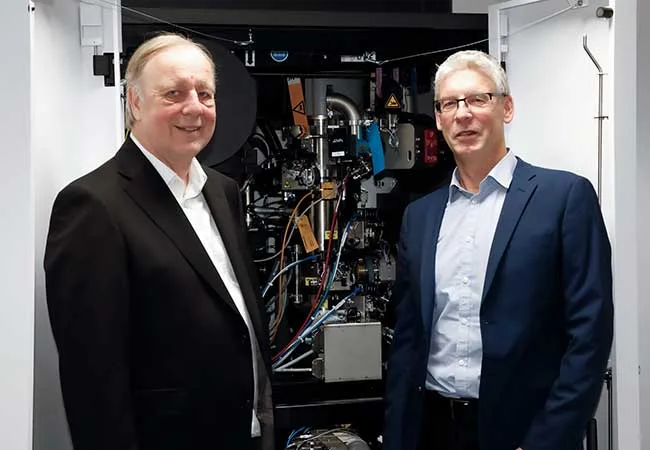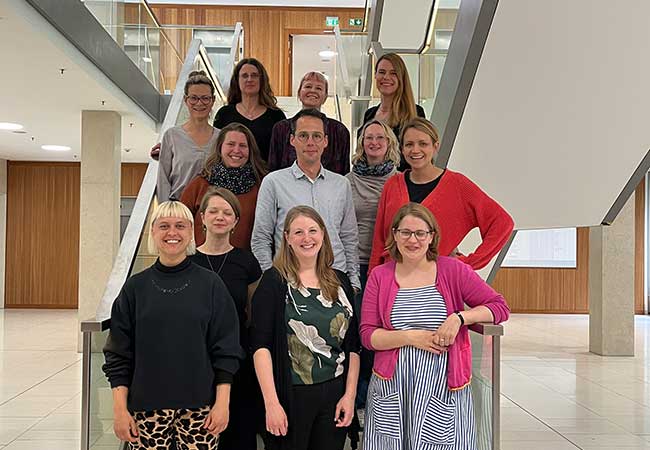On September 24, a material sample from one of the most primordial objects in our solar system arrived on Earth: While on flyby, a NASA spacecraft dropped a capsule containing more than 200 grams of dust gathered from asteroid Bennu, which it had visited three years earlier. The material will be studied at Goethe University Frankfurt’s new Schwiete Cosmochemisty Laboratory, inaugurated in early October. The lab’s centerpiece is a state-of-the-art transmission electron microscope (TEM) that allows tiny samples of material to be chemically and structurally analyzed. The investment funds were provided by the Dr. Rolf M. Schwiete Stiftung, the German Research Foundation [Deutsche Forschungsgemeinschaft, DFG], and the federal state of Hesse.

Over the course of time, the dust that orbited our young sun not only formed the planets, but also millions of chunks of matter. Today, about 800,000 of these chunks orbit the sun along the asteroid belt between Mars and Jupiter. Some of them even come quite close to Earth again and again – these are known as NEAs (Near Earth Asteroids). Many asteroids have hardly changed since their formation, and thus constitute a kind of geological archive of the solar system.
To further explore that characteristic, in 2016, NASA sent the OSIRIS-REx space probe to near Earth asteroid Bennu, a celestial body only 500 meters in size and one of our solar system’s most pristine objects. Using a vacuum cleaner-like device, OSIRIS-REx removed about 220 grams of material from Bennu’s surface in 2020, and returned to Earth with it. During its flyby, the spacecraft on September 24 dropped a capsule containing the asteroid dust. A few grams of the precious material are expected to arrive at Goethe University Frankfurt in mid-October, where the dust will be studied in the Schwiete Cosmochemisty Laboratory, inaugurated on October 6. The Goethe University laboratory is one of only four TEM laboratories worldwide and the only one located outside the US to have been entrusted with this type of material analysis. The team led by Prof. Brenker also uses the ESRF synchrotron radiation facility in Grenoble, as well as Hamburg-based DESY in their highly specialized research.
In the words of Goethe University Frankfurt’s nano-geoscientist Prof. Frank Brenker: „It is a great privilege to be able to study material from asteroids. Unlike meteorites, which hit the Earth, asteroid material has not been in contact with the Earth’s atmosphere, and we can study it in the state it has out in space. Among others, we will be determining the amount and distribution of so-called rare earth metals in the material sample we received from Bennu – which will allow important conclusions to be drawn about the evolution of our solar system and Earth.“
To support their research, the scientists can now use the high-tech, high-performance transmission electron microscope at Goethe University Frankfurt’s newly founded Schwiete Cosmochemisty Laboratory. Speaking at the lab’s inauguration ceremony, Dr. Jürgen Staiger, Chairman of the Dr. Rolf M. Schwiete Stiftung, said, „Prof. Brenker has set up procedures at Goethe University to examine sensitive samples in a manner that very few scientific teams worldwide have mastered. We are pleased to make a significant contribution to the acquisition of the transmission electron microscope and thereby promote cutting-edge research in geochemistry and cosmochemistry, and are very excited to see what the research results will tell us about the creation of our planet.“
Dr. Rolf M. Schwiete Stiftung: https://schwiete-stiftung.com/





